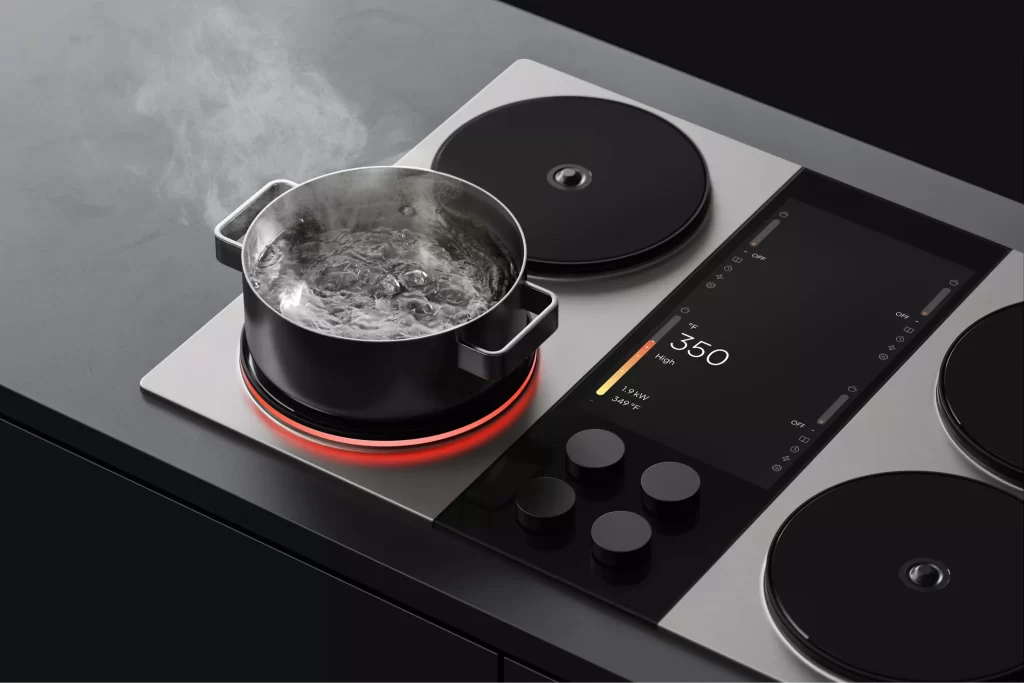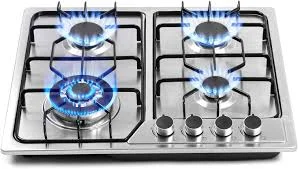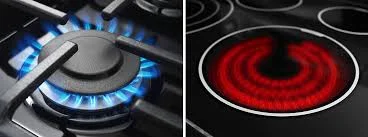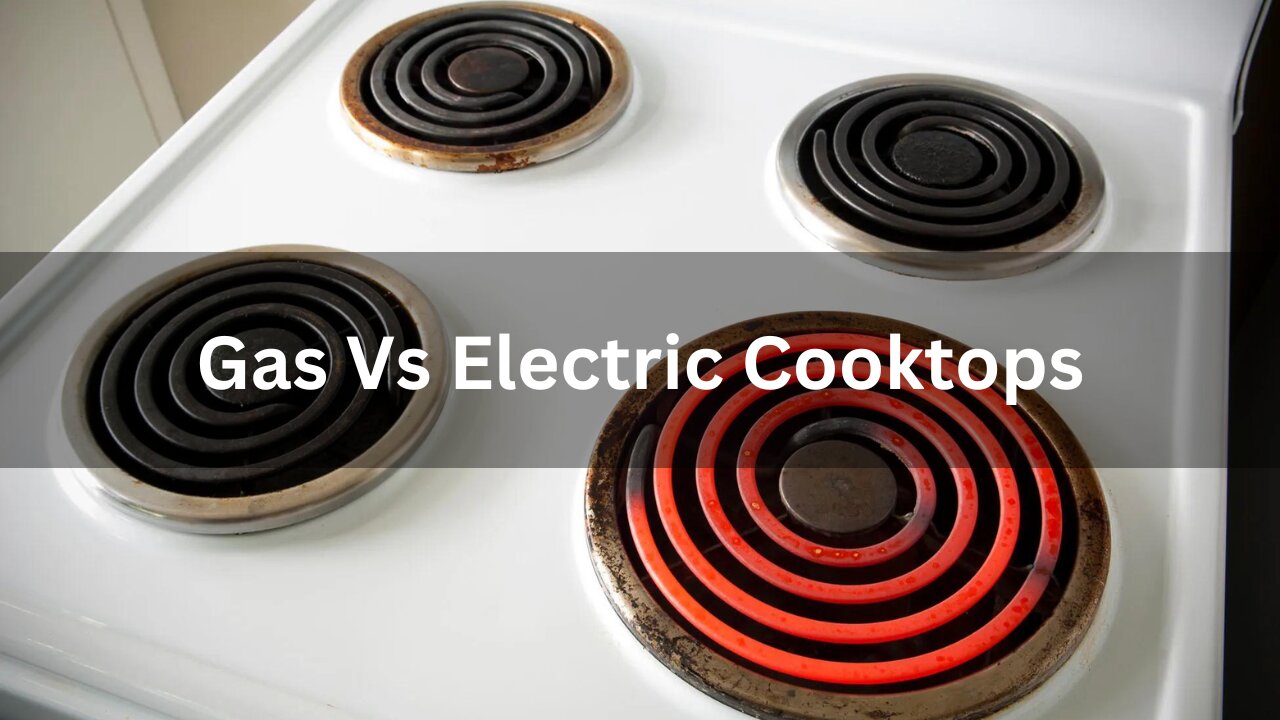When selecting the best material for a gas cooktop, the decision can significantly impact your cooking experience, kitchen aesthetics, and appliance maintenance. The material of a gas cooktop affects not only its durability and heat distribution but also its ease of cleaning and resistance to wear and tear. With various options available, from stainless steel to glass and enamel, understanding the benefits and drawbacks of each material is crucial for making an informed choice.
In this blog post, we’ll explore the various materials used in gas cooktops, examining their properties, advantages, and considerations to help you determine the best fit for your kitchen needs. Whether you prioritize style, functionality, or ease of maintenance, our guide will provide the insights needed to choose the perfect material for your gas cooktop.
Table of Contents
Electric Cooktop
An electric cooktop is a kitchen appliance designed for cooking food using electricity as the primary heat source. It typically consists of one or more heating elements embedded in a smooth, flat glass-ceramic, stainless steel, or porcelain enamel surface. Electric cooktops come in various configurations, including coil, radiant, and induction types.

Benefits of Electric Cooktops
Electric cooktops offer several benefits that make them a popular choice for kitchens:
- Precise Temperature Control: Electric cooktops provide precise temperature control, allowing users to adjust heat levels accurately. This precision is essential for simmering delicate sauces or searing meats at specific temperatures.
- Even Heating: Electric cooktops’ smooth, flat surface ensures even heat distribution across the cooking area, eliminating hot spots and promoting consistent cooking results. This makes it easier to achieve perfectly cooked dishes.
- Safety Features: Many electric cooktops have automatic shut-off controls, residual heat indicators, and child lock functions. These features help prevent accidents and minimize the risk of burns or fire hazards.
- Easy to Clean: Electric cooktops’ flat surface makes them easy to clean, as there are no crevices or grates where food particles can get trapped. Spills and splatters can be quickly wiped away with a damp cloth, keeping the cooktop pristine.
- Versatility: Electric cooktops are compatible with various cookware, including glass, ceramic, stainless steel, and copper. This versatility allows users to use their preferred pots and pans without compatibility issues.
- Energy Efficiency: Electric cooktops are generally more energy-efficient than gas cooktops, as they transfer heat directly to the cookware without wasting energy on heating the surrounding air. It can result in lower energy bills and reduced environmental impact.
- Modern Design: Electric cooktops often feature sleek, modern designs that can enhance a kitchen’s aesthetic appeal. They come in various styles and finishes to complement any decor, from minimalist to contemporary.
Electric cooktops offer convenience, safety, and efficiency, making them an excellent choice for amateur and culinary enthusiasts.
Disadvantages Of Electric Cooktops
While electric cooktops offer many advantages, they also come with some disadvantages that should be considered:
- Slow heating: Electric cooktops generally take longer than gas cooktops. This slow heating process can increase cooking times, especially for tasks that require heat levels or rapid temperature changes.
- Limited Temperature Control: Despite offering precise temperature control, electric cooktops can be limited in quickly adjusting heat levels. This can be difficult for techniques like sautéing or searing, where rapid temperature changes are critical.
- Dependence on Electricity: Electric cooktops rely entirely on electricity for operation, which means they may be unusable during a power outage. This lack of functionality can be inconvenient, especially in areas with frequent power outages.
- Susceptibility to damage: The smooth glass-ceramic surface of electric cooktops can be susceptible to scratches, cracks, and chips if not handled carefully. Some types of cookware, such as cast iron or stoneware, can cause damage if they slip on a surface.
- Uneven heating with coil cooktops: Due to the placement of the heating elements, coil electric cooktops can experience uneven heating. It can result in hot spots and uneven cooking, requiring consumers to adjust their cooking techniques to compensate.
- Limited compatibility with cookware: Electric cooktops are generally compatible with a wide range of cookware. However, they may only suit some types, such as induction-specific or large pots and pans. Pan. This limitation can limit consumer options and require additional investment in compatible cookware.
- Visible residue and stains: Despite being easy to clean, electric cooktops can show noticeable residue and stains, especially on glass-ceramic surfaces. Stubborn stains or burnt-on food particles may require unique cleaning products or techniques to remove them.
Despite these disadvantages, many consumers find that the benefits of electric cooktops outweigh the drawbacks, especially when factors such as safety, ease of cleaning, and versatility are considered. Choosing electric and other cooktops depends on individual preferences, cooking habits, and kitchen needs.
Real-Life Stories: Who Loves Their Electric Cooktop?
Now that we’ve talked about the pros and cons, let’s look at some real-life examples of people who love their electric cooktops. Here are a few stories:
➊ Sarah’s Story: “When we remodeled our kitchen, we went with an electric cooktop for the sleek look. At first, I missed the gas stove’s quick heat, but now I love how easy it is to clean. Plus, it heats my soups evenly without burning the bottom of the pan!”
➋ John’s Experience: “I have an induction cooktop, and it’s been amazing. It heats up almost instantly, and I don’t worry about gas leaks anymore. The best part? I can boil water in under two minutes!”
These are just a couple of examples, but they show that electric cooktops are a solid choice for many people.
Gas Cooktop
A gas cooktop is a kitchen appliance used for cooking. It is fueled by natural or liquefied petroleum gas (propane) and consists of one or more gas burners arranged on a flat surface. Gas cooktops are usually made of stainless steel, glass ceramic, or enamel-coated steel. They come in various configurations, including traditional open burners, sealed burners, and continuous grates.

Benefits Of Gas Cooktops
Gas cooktops offer many advantages that make them a popular choice for many cooks:
- Instant Heat Control: Gas cooktops provide instant heat, allowing temperature to be adjusted instantly. This response gives chefs precise control over the cooking process, making it easier to achieve desired results.
- Even Heat Distribution: The open flame of a gas burner provides even heat distribution across the bottom of the cookware, helping to prevent hot spots and ensure even cooking.
- Visual Feedback: The gas burner’s visible flame provides visual feedback, allowing cooks to assess heat intensity and quickly adjust as needed. It makes monitoring the cooking process more accessible and avoids overcooking or burning.
- Versatility: Gas cooktops are compatible with various cookware materials, including stainless steel, cast iron, and copper. This versatility allows cooks to use their favorite pots and pans without compatibility issues.
- High-heat cooking: Gas cooktops excel at high-heat cooking methods such as searing, stir-frying, and boiling. The intense heat gas burners produce can quickly heat cookware and create a caramelized exterior on meats and vegetables.
- Reliability: Gas cooktops can continue functioning during power outages, as they do not rely on electricity for operation.
- Energy efficiency: Gas cooktops are generally more energy efficient than electric cooktops, as they heat the cookware directly without preheating the cooktop surface.
- Easy to clean: Gas cooktops are relatively easy to clean, with removable burner grates and sealed burners that help control spills. Regular maintenance can keep appliances looking new for longer.
Gas cooktops offer a combination of precision, versatility, and reliability that many cooks love, making them a popular choice for kitchens of all sizes.
Disadvantages Of Gas Cooktops
While gas cooktops offer many advantages, they also come with some disadvantages that should be considered:
- Installation Requirements: Gas cooktops require a gas supply line, which may require professional installation and cost more than electric cooktops. Not all homes have access to a natural gas supply, requiring alternative fuel sources such as propane.
- Potential Safety Hazards: A gas burner’s open flame can cause fire or gas leakage if not used properly. Additionally, gas cooktops can produce carbon monoxide if not properly ventilated, causing indoor air pollution and health hazards.
- Maintenance: Gas cooktops require regular maintenance to ensure safe and efficient operation. That includes cleaning burner components, checking for gas leaks, and ensuring proper ventilation. Neglecting maintenance tasks can lead to safety hazards and reduced performance.
- Uneven heat: Gas burners can produce uneven heat distribution, which can cause hot spots or uneven cooking. It can be especially problematic for large or irregularly shaped cookware, which may receive only some heat across the entire cooking surface.
- Limited temperature control: While gas cooktops offer instant heat control, they may be limited in achieving lower heat levels than electric cooktops. This can make tasks like simmering delicate sauces or melting chocolate more difficult to control accurately.
- Sensitivity to wind: Outdoor gas cooktops or indoor cooktops located near open windows can be affected by wind, disrupting the flame and reducing cooking efficiency. Wind guards or indoor ventilation systems may be necessary to reduce this problem.
- Cooktop surface material: The material used for the cooktop surface, such as stainless steel or glass ceramic, can become scratched, stained, or discolored over time. Proper care and maintenance are essential to maintaining the appearance and functionality of the cooktop surface.
- Noise: Some gas burners can produce a noticeable clicking or hissing sound during operation, which can be annoying or distracting, especially in quiet environments.
Despite these disadvantages, many cooks prefer gas cooktops for their responsiveness, precise control, and ability to achieve high-heat cooking methods. Choosing between gas and other cooktops depends on individual preferences, kitchen needs, and safety concerns.
Difference Between Gas And Electric Cooktop
Gas cooktops offer instant heat and precise temperature control with open flames, which are ideal for high-heat cooking methods, while electric cooktops offer versatility and safety with heating elements. Gas requires a gas supply line, which poses potential safety hazards, while electricity requires only one outlet. Gas is more energy efficient, but electricity may be better to suit specific preferences or kitchen setups. Ultimately, the choice depends on individual needs and safety considerations.

Certainly! Here’s a comparison table highlighting the key differences between gas and electric cooktops:
| Aspect | Gas Cooktop | Electric Cooktop |
| Heating Mechanism | It uses open flames produced by gas burners | Uses heating elements (coils or radiant elements) |
| Responsiveness | Provides instant heat and rapid temperature control | It may take longer to heat up and adjust temperatures |
| Installation Requirements | Requires access to a gas or propane supply line | It only requires access to an electrical outlet |
| Energy Efficiency | Generally more energy-efficient | It may be less energy-efficient |
| Safety Considerations | Potential fire hazards, gas leaks, carbon monoxide emissions | Safer in terms of fire hazards and gas leaks |
| Cooking Performance | Preferred for high-heat cooking methods (searing, stir-frying) | Suitable for a wide range of cooking techniques |
This table provides a concise overview of the main differences between gas and electric cooktops, allowing easy comparison of their features and characteristics.
Which Cooktop Is Best?
Determining the “best” cooktop depends on various factors, including personal preference, cooking habits, kitchen setup, and safety considerations. Both gas and electric cooktops offer distinct advantages and disadvantages:
Gas Cooktops:
- Advantages: instant heat, precise temperature control, preference for high-heat cooking methods, visible fire for visual feedback, and generally more energy efficient.
- The cons are that a gas supply line is required, potential safety hazards (fire, gas emissions, carbon monoxide), and it may be less suitable for certain kitchen setups.
Electric Cooktops:
- Advantages: It is versatile for different cooking techniques, safer in terms of fire hazards and gas emissions, and easy to install, with only one electrical outlet required.
- Disadvantages: It may take longer to heat up, and there is limited temperature control compared to gas. It is potentially less energy efficient.
Ultimately, choosing the best cooktop depends on your individual needs, preferences, and kitchen setup. Before making a decision, consider factors such as cooking habits, desired features, safety considerations, and compatibility with your kitchen infrastructure. Some cooks prefer the precise control and high-heat capabilities of gas cooktops, while others prefer the versatility and safety of electric cooktops. Reviewing these factors and weighing the pros and cons will help you determine which type of cooktop is best for your needs.
Top and Budget-friendly
For high-end gas cooktops, brands like Wolf, Thermador, and Viking offer advanced features and exceptional performance, ideal for professional chefs or cooking enthusiasts. However, these options come with a higher price tag.
For more budget-friendly electric cooktops, consider brands like GE, Frigidaire, and Whirlpool, which offer reliable performance without the higher costs of premium models. While they may lack some advanced features, they provide solid functionality at an affordable price.
How to Determine Which Cooktop Is Best for You
Determining which cooktop is best for you involves considering several essential factors that suit your cooking habits, lifestyle, and kitchen setup. Here are some steps to help you make an informed decision:
- Assess your cooking habits: Consider the types of dishes you cook frequently and your favorite cooking methods. Do you often use high-heat cooking techniques such as searing and stir-frying? Or do you prefer gentle simmering and precise temperature control for delicate sauces? Your cooking habits will influence whether a gas or electric cooktop is best for your needs.
- Assess your kitchen setup: Consider your kitchen’s infrastructure, such as gas lines and electrical outlets. If your kitchen is already equipped with a gas line, choosing a gas cooktop may be easier and cheaper. Conversely, if you don’t have access to a gas line or like the simplicity of an electrical installation, an electric cooktop may be a better choice.
- Consider safety issues: Consider the safety features that are important to you, such as flame failure protection, automatic shut-off control, and child lock functions. Gas cooktops can pose potential safety hazards, such as fire or gas leaks, while electric cooktops are generally considered safer in terms of fire hazards.
- Assess energy efficiency: Assess the energy efficiency of each cooktop type and how it aligns with your sustainability goals and energy usage patterns. Gas cooktops are generally more energy-efficient than electric cooktops, but the difference can vary based on factors such as insulation and burner efficiency.
- Budget and long-term cost factor: Determine your budget for buying and running a cooktop, considering both upfront costs and long-term costs such as energy consumption and maintenance. Although gas cooktops may have a higher initial cost, they can offer lower operating costs over time due to their energy efficiency.
- Research Brands and Models: Explore different brands and models of gas and electric cooktops to compare features, specifications, and customer reviews. Look for leading brands with quality construction, reliable performance, and excellent customer support.
- Test cooktops: Visit appliance stores or showrooms to see and test different cooktop models in person. Pay attention to factors like ease of use, responsiveness, and overall build quality to understand how each cooktop performs in real-world cooking scenarios.
By following these steps and carefully considering your specific needs and preferences, you can determine which type of cooktop—gas or electric—is best for your kitchen and cooking style.
You Can Also Read: Electric vs. Gas Stove: Which Is Really More Efficient?
How to Choose the Right Electric Cooktop
If you’re thinking about switching to an electric cooktop, how do you choose the right one? Let’s go over some basics.
Types of Electric Cooktops
- Coil Burners: These are the classic, raised coils that you might remember from older stoves. They’re budget-friendly but can be a little harder to clean.
- Smooth Top: These cooktops have a smooth glass surface that’s super easy to clean and looks sleek.
- Induction Cooktop: These use magnetic energy to heat your pot directly, without heating the cooktop itself.
Important Features to Look For
- Safety Features: Look for automatic shut-off or a child lock if you have little ones at home.
- Temperature Control: Some cooktops have digital controls that allow you to set an exact temperature.
- Size and Fit: Make sure the cooktop will fit in your kitchen! Measure your counter space before you buy.
Do Chefs Prefer Gas or Electric Cooktops?
When it comes to cooking, the debate between gas and electric cooktops has been ongoing for years. Both options have their own set of advantages and disadvantages, making it difficult to determine which one is better. However, when it comes to professional chefs, there is a clear preference for gas cooktops.
One of the main reasons why chefs prefer gas cooktops over electric ones is the instant heat control they provide. Gas burners can quickly adjust from high to low heat with just a simple turn of a knob, allowing for precise temperature control while cooking. This is especially important in delicate dishes that require quick changes in heat levels. On the other hand, electric cooktops take longer to adjust and cool down, making it challenging for chefs to achieve perfect results.
Another reason chefs prefer gas cooktops is their ability to evenly distribute heat across the entire surface. Unlike electric cooktops, where heat radiates from coils or elements placed underneath the cooking surface, gas burners provide direct flames that evenly spread out under pots and pans. This even distribution of heat ensures that food cooks evenly and prevents hot spots or cold spots on the cooking surface.

Additionally, many chefs argue that gas cooktops offer better overall performance than electric ones. The open flame produced by a gas burner allows for more direct contact with the pot or pan, resulting in faster heating times and improved cooking efficiency. This is particularly beneficial in high-paced restaurant kitchens where time is crucial.
Furthermore, some chefs believe that gas cooktops give them more flexibility regarding what types of pots and pans they can use. Electric burners require specific types of pots and pans with flat bottoms; otherwise, they may need to be fixed. In contrast, most gas burners have wide grates that allow for the use of various sizes and shapes of pots and pans without any limitations.
However, this does not mean that electric cooktops do not have advantages. They are generally safer to use, as no open flame is involved, making them ideal for households with children. Electric cooktops also have a smoother and easier-to-clean surface compared to gas ones.
While both gas and electric cooktops have their own pros and cons, chefs clearly prefer gas for its instant heat control, even heat distribution, better performance, and flexibility in cooking. However, personal preferences and needs may vary from chef to chef, so it ultimately comes down to individual preferences.
Should I Replace the Gas Cooktop With An Electric One?
When deciding between a gas or electric cooktop, many factors must be considered. While both options have their advantages and drawbacks, one of the most common questions people ask is whether they should replace their gas cooktop with an electric one.
The decision to switch from a gas cooktop to an electric one ultimately depends on personal preference and lifestyle. However, a few key considerations can help you make an informed decision.
1. Cost Efficiency
One factor that often influences the choice between gas and electric cooktops is cost efficiency. While gas cooktops may have a lower initial cost, they require a constant supply of natural gas, which can increase over time. On the other hand, electric cooktops use electricity, which is more expensive than natural gas in most areas.
However, when considering cost efficiency, it’s essential to consider long-term maintenance and repair costs. Gas cooktops may require frequent maintenance due to potential burner or ignition system issues. On the other hand, electric cooktops typically have fewer components that need regular upkeep.
2. Cooking Performance
Another factor to consider is cooking performance. Gas cooktops are known for providing precise temperature control and even heat distribution, making them popular among professional chefs and cooking enthusiasts. However, modern electric cooktops now come with advanced features such as induction heating, which offers similar benefits in terms of temperature control and even heat distribution.
Additionally, some people prefer the instant heat provided by a gas flame rather than waiting for an electric burner to heat up. This can be especially important when cooking dishes that require quick temperature changes.
3. Safety Considerations
Safety is always a top priority in any kitchen setting. If improperly maintained or used correctly, gas stoves risk fuel leaks or accidental fires. Electric stovetops eliminate these risks as they do not have open flames. However, they carry the risk of electric shock if not correctly used.
4. Environmental Impact
Regarding environmental impact, electric cooktops are often considered more eco-friendly. They produce zero emissions and can be powered by renewable energy sources such as solar or wind power. In contrast, gas stoves produce carbon monoxide and other pollutants that contribute to air pollution.
There is no clear winner when choosing between a gas or electric cooktop. It ultimately depends on your individual needs and preferences. If cost efficiency and precise temperature control are your top priorities, then a gas cooktop may be your better choice. On the other hand, if safety and environmental impact are important factors, an electric cooktop may be the way to go. Consider all these factors carefully before deciding to ensure that you choose the best option for your kitchen and lifestyle.
Are Electric Cooktops Safer Than Gas?
Many homeowners worry about safety when choosing between an electric cooktop and a gas cooktop. While both types of cooktops have unique benefits, certain factors make electric cooktops a safer option.
One significant advantage of electric cooktops is the absence of an open flame. Gas stoves use flames to heat the cooking surface, which can pose a fire risk if not used carefully. With electric cooktops, the heat is generated by electricity flowing through coils or ceramic glass elements under the cooking surface. This eliminates the risk of gas leaks or accidental fires caused by flammable materials being too close to an open flame.
In addition, electric cooktops are also equipped with safety features such as automatic shut-off mechanisms that turn off the heat when they detect overheating or when the pan is removed from the burner. This feature prevents burns and reduces energy consumption and potential damage to your kitchen appliances.
Furthermore, electric cooktops provide better control over temperature settings than gas stoves. Electric models usually have precise temperature controls that allow you to set specific temperatures for different cooking methods. This reduces the likelihood of accidentally burning food or causing flare-ups on your stove.
Another safety benefit of using electric cooktops is their ease of cleaning. Unlike gas stovetops, which require frequent removal and cleaning of grates and burners, most modern electric models have smooth surfaces that are easy to clean without any hassle or risk of getting burned by hot surfaces.
On the other hand, although natural gas is generally considered safe for household use, gas leaks are always a possibility, and they can be hazardous if left undetected. Electric stoves do not emit fumes or gases during use, making them less likely to cause health hazards in your home.
While both types of cooktops have advantages, electric cooktops have a clear edge when it comes to safety. The absence of an open flame, precise temperature control, automatic shut-off features, and easy cleaning make electric cooktops a safer choice for any household. So, if safety is your top priority in the kitchen, investing in an electric cooktop may be the right decision for you and your family.
Why Choose an Electric Cooktop?
Are Electric Cooktops More Energy Efficient?
Electric cooktops, particularly induction models, are known for their energy efficiency. Induction cooktops use electromagnetic energy to directly heat pots and pans, minimizing heat loss. This efficiency not only saves energy but can also reduce your electricity bills over time.
Is Cleaning Easier with an Electric Cooktop?
One of the standout features of electric cooktops is their ease of cleaning. The smooth surface of electric cooktops, especially those with a glass-ceramic surface, makes it simple to wipe away spills and stains. This is a significant advantage over gas cooktops, which often have burners and grates that require more effort to clean.
How Does Safety Compare Between Electric and Gas Cooktops?
Electric cooktops are often considered safer because they don’t use open flames. This reduces the risk of fire and eliminates concerns about gas leaks. For households with small children or pets, the absence of open flames is a significant safety advantage.
Are There Any Downsides to Electric Cooktops?
While electric cooktops have many benefits, they also come with some downsides. They generally heat up more slowly compared to gas cooktops, which can be a drawback for those who cook frequently or require high heat for specific recipes. Additionally, some electric cooktops, particularly older models, may have uneven heating.
Understanding the Types of Electric Cooktops
What Are Radiant Electric Cooktops?
Radiant electric cooktops use coils beneath a glass-ceramic surface to produce heat. They are the most common type and are known for their straightforward design and affordability. However, they can be slower to heat and may have less precise temperature control.
What Are Induction Cooktops?
Induction cooktops are the most advanced type of electric cooktop. They use magnetic fields to directly heat cookware, making them highly efficient and quick to respond. They are also more expensive but are favored for their precise control and speed.
What Are Coil Electric Cooktops?
Coil electric cooktops feature exposed metal coils that generate heat. They are often the least expensive option but can be more challenging to clean and may not offer the same level of heat control as other types.
Conclusion
Ultimately, choosing the best cooktop for your kitchen involves carefully evaluating your cooking habits, kitchen setup, safety considerations, and budget constraints. Gas and electric cooktops offer unique advantages and disadvantages, catering to different preferences and needs.
Gas cooktops provide instant heat control, precise temperature adjustment, and high efficiency for high-heat cooking methods. Many chefs and cooking enthusiasts favor them for the flame’s response and visual feedback. However, they require a gas supply line and can pose safety hazards if not properly used or maintained.
On the other hand, electric cooktops offer versatility, safety features, and ease of installation, making them a practical choice for many households. They provide precise temperature control, even heat distribution, and compatibility with different cookware materials. However, they can take longer to heat up and have a limited temperature range compared to gas cooktops.
Ultimately, the best cooktop for you depends on your individual preferences, cooking habits, and kitchen needs. By considering factors such as cooking style, safety features, energy efficiency, and budget, you can decide on the cooktop that best suits your needs. Whether you choose the precision of a gas cooktop or the convenience of an electric cooktop, choosing the right appliances will enhance your cooking experience and complement your kitchen.
FAQ
What are the main advantages of electric cooktops?
Electric cooktops offer easy cleaning, enhanced safety with no open flames, and energy efficiency, especially with induction models. They are also easier to install compared to gas cooktops.
Do electric cooktops cook faster than gas cooktops?
While induction electric cooktops can cook very quickly, traditional radiant and coil electric cooktops might not cook faster than gas. Induction cooktops are known for their speed and precise temperature control.
Are electric cooktops more expensive than gas cooktops?
Electric cooktops can be more expensive upfront, particularly induction models. However, they may offer savings in energy costs over time due to their efficiency.
How do I choose between an electric and gas cooktop?
Consider your cooking habits, budget, and kitchen setup. Electric cooktops are great for ease of cleaning and safety, while gas cooktops offer immediate heat control and traditional cooking benefits.




